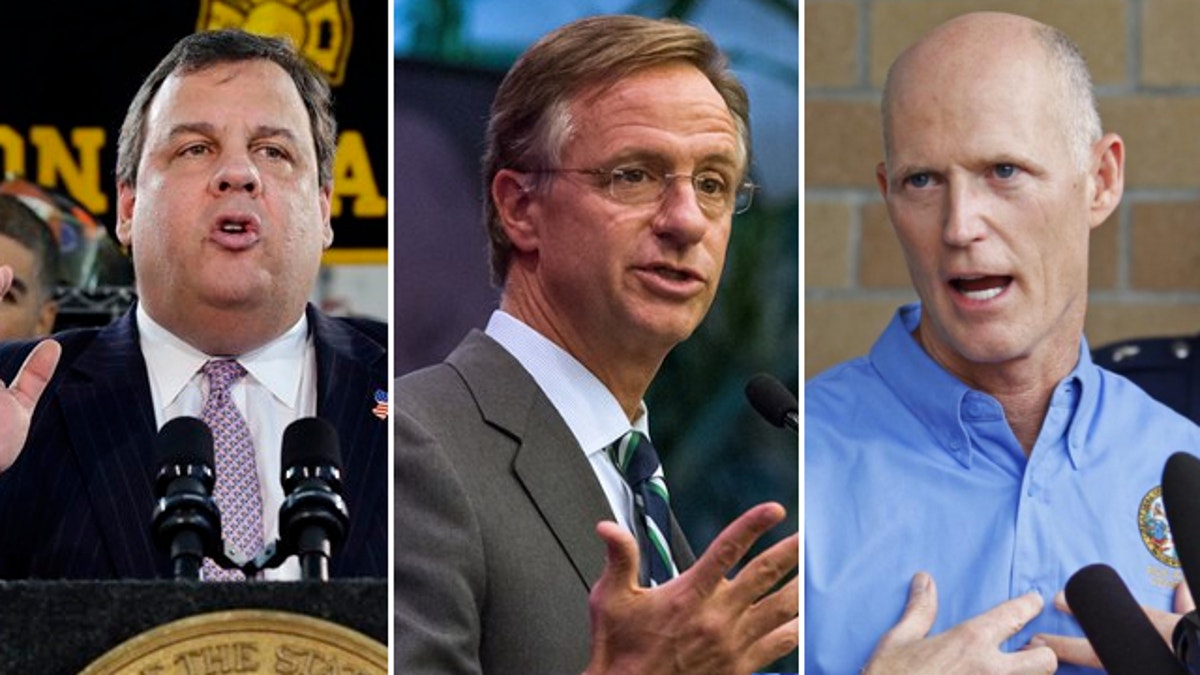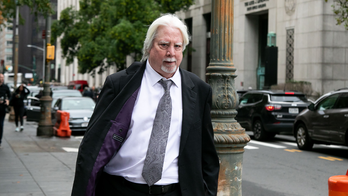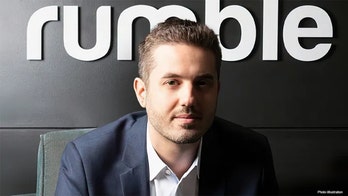
From left, New Jersey Gov. Chris Christie, Tennessee Gov. Bill Haslam and Florida Gov. Rick Scott. (AP/Reuters)
As the final deadline for creating state health insurance exchanges passed Friday, New Jersey, Tennessee and Florida said they would not work with the federal government on establishing insurance markets required under ObamaCare.
Exchanges are online markets required under the federal health care law where consumers will be able to buy individual private policies and apply for government subsidies to help pay their premiums.
In his announcement Friday, New Jersey Gov. Chris Christie said his administration is committed to complying with ObamaCare, but "only in a manner that is the most effective and efficient for the residents of New Jersey, and the businesses that will carry the costs of this new program."
Christie, who previously vetoed legislation establishing a state-run health insurance exchange, said in a statement that the federal government is best equipped to operate the exchange.
Tennessee Gov. Bill Haslam, a Republican, said in a letter to U.S. Health and Human Resources Secretary Kathleen Sebelius that the partnership model doesn't address his concerns over what he called "aggressive federal timelines, a lack of true flexibility for states, and misguided federal policies."
Haslam noted that he had the same complaints when he rejected a state-based exchange in December. His deadline decision means Tennesseans will participate in an exchange completely run by the federal government.
In Florida, which already missed the deadline for operating an exchange on its own, Gov. Rick Scott also declined to partner with the federal government.
“We continue to be concerned about the many unknowns impacting the cost of operating an exchange, and simply do not have enough information to make a decision about running one at this time,” Scott’s communications director, Melissa Sellers, told the Palm Beach Post.
Friday's deadline showed that the nation is about evenly split between states that decided they want a say in running new insurance markets and states that are defaulting to federal control because they don't want to participate in the exchanges. That choice was left to state governments under the law.
With some exceptions, states led by Democrats opted to set up their own markets, called exchanges, and Republican-led states declined.
Barring last-minute switches that may not be revealed until next week, 23 states plus Washington, D.C., have opted to run their own markets or partner with the Obama administration to do so.
Twenty-six states are defaulting to the feds. But in several of those, Republican governors are trying to carve out some kind of role by negotiating with Sebelius. Utah's status is unclear. It received initial federal approval to run its own market, but appears to be reconsidering.
With some exceptions, including Idaho, Nevada and New Mexico, Republican-led states are maintaining a hands-off posture, meaning the federal government will step in.
"There is a sense of irony that it's the more conservative states" yielding to federal control, said Sandy Praeger, the Republican insurance commissioner in Kansas, a state declining to run its own exchange. First, she said, the law's opponents "put their money on the Supreme Court, then on the election. Now that it's a reality, we may see some movement."
They're not budging in Austin. "Texas is not interested in being a subcontractor to Obamacare," said Lucy Nashed, spokeswoman for Gov. Rick Perry, who remains opposed to mandates in the law.
In Kansas, Praeger supported a state-run exchange, but lost the political struggle to Gov. Sam Brownback. She says Kansans will be closely watching what happens in neighboring Colorado, where the state will run the market. She doubts that consumers in her state would relish dealing with a call center on the other side of the country. The federal exchange may have some local window-dressing but it's expected to function as a national program.
Christine Ferguson, director of the Rhode Island Health Benefits Exchange, says she expects to see a big shift to state control in the next few years. "Many of the states have just run out of time for a variety of reasons," said Ferguson. "I'd be surprised if in the longer run every state didn't want to have its own approach."
In some ways, the federal government has a head start on the states. It already operates the Medicare Plan Finder for health insurance and prescription plans that serve seniors, and the Federal Employees Health Benefits Program. Both have many of the features of the new insurance markets.
Administration officials are keeping mum about what the new federal exchange will look like, except that it will open on time and people in all 50 states will have the coverage they're entitled to by law.
Whether or not the bugs get worked out, consumers will be able to start signing up Oct. 1 for coverage that takes effect Jan. 1. That's also when two other major provisions of the law kick in: the mandate that almost all Americans carry health insurance, and the rule that says insurers can no longer turn away people in poor health.
States setting up their own exchanges are already taking different paths. Some will operate their markets much like major employers run their health plans, as "active purchasers" offering a limited choice of insurance carriers to drive better bargains. Others will open their markets to all insurers that meet basic standards, and let consumers decide.
"It's healthy for the states to have various choices," said Ben Nelson, CEO of the National Association of Insurance Commissioners. "And there's no barrier to taking somebody else's ideas and making them work in your situation." A former U.S. senator from Nebraska, Nelson was one of several conservative Democrats who provided crucial votes to pass the overhaul.
The Associated Press contributed to this report.




